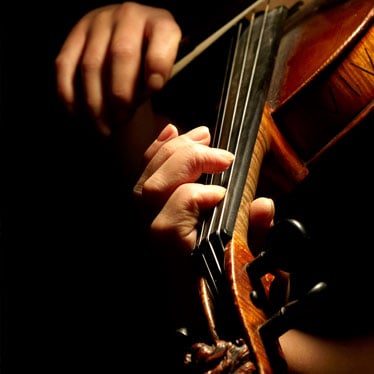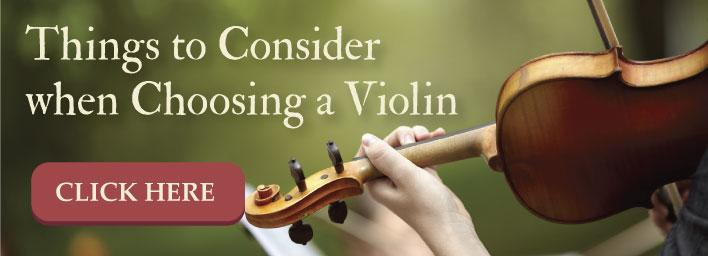To Rent or To Buy a Violin? That is the Question

Many parents of students (and adults) who are interested in learning to play the violin are faced with the decision to either buy a violin or rent one. The choice is entirely personal, but there are a number of considerations that can help you make your selection. Essentially, you want to choose a violin that will support the learning process and encourage student progress, but if you’ve never purchased a string instrument before, you may have a vague impression that violins are expensive, and that choosing one takes considerable knowledge.
Because violins are an artisan piece of craftsmanship, instruments that were crafted by master luthiers like Guarneri and Stradivarius in the early 1600’s are still being played today. Indeed, it’s pretty cool to play an instrument that hasn’t been altered in the fundamental way it’s constructed for over 400 years. And although you probably won’t be considering one of those masterpieces, deciding whether to buy a violin or rent one has a lot to do with those ideal models. Armed with a bit of information and the personal factors involved, you can make the best choice for your student, and your budget.
Personal Considerations
First, you’ll need to outline the most important factors in your personal decision. Each one of these items helps you narrow down whether or not buying or renting is best for your particular situation.
- Age of the student. If you or your child is interested in learning to play the violin, this is a good thing. Music education builds lifelong cognitive benefits and workforce skills that will stand you in good stead for the rest of your life, and violins are made in fractional sizes to allow even very young children to opportunity to learn. However, if your child is very young, and requires an instrument that is ½ or less than ½ size, it may be a better option to rent. Although there are a number of great smaller sized violins available, usually for sale by the owner, unless you can have a professional assess the instrument for you if you buy a violin sight unseen, you may have bought a lemon. Choosing a good rental instrument that will allow you to upgrade to a larger one when you child needs it might be your best option.
- Student interest. Another factor to consider is how excited your child is about learning to play the violin, or how susceptible he or she is about new hobbies. For example, if your home is littered with the paraphernalia of abandoned pursuits, renting your violin may be wise. A good student violin outfit will cost around $500-$600, so you may want to rent an instrument for a few months at first so that you can judge your child’s level of interest. You can always buy a violin once you know that he or she has found a great fit.
- Personal Budget. Renting an instrument like the violin can be a better choice for some families. The purchase amount of a quality student instrument is not always easy to swing without some planning, so renting allows you to get started learning the basics, without having to wait until your budget will allow you to buy a violin. However, after a certain amount of time, buying is more economical. Most rental agreements are paid in affordable monthly installments (typically around $20), and many violin shops simply require the first month’s amount, along with a small security deposit. Some shop owners will even apply a portion of your rental history towards the cost of a new instrument. Check with your local dealer about their specific terms.
Things You Should Know About Violins before Purchasing or Renting
There are a few things to keep in mind before you choose to buy a violin or rent one.
- When you buy a violin or rent one, make sure that the instrument set-up is included. This process involves the placement of the bridge, strings, and soundpost, and has a big influence on the sound the violin can produce.
- Don’t forget accessories. Most rental violins include a case, bow, and rosin, and if you buy a violin outfit, those items will also be included.
- Listen to the instrument first. Before buying or renting, ask to hear the violin played so that you can hear the tonal quality. To be successful, it’s imperative for new students to be able to make progress and sound as good as possible on their instrument.
- Whether you rent or buy a violin, ask your insurance agent about including it in your coverage.
Choosing to rent or buy a violin is a personal decision, but by taking your time and outlining your personal needs, you’ll be able to make the best decision. One that supports the learning process and meets your specific needs.


